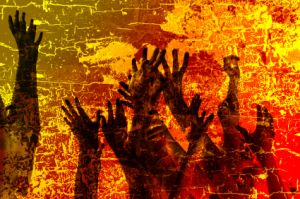 Religion has long been viewed as a deterrent to immoral behavior, but individual religious beliefs may play a particularly important role. A recent study published in the Library of Science Journal PLoS ONE suggests that places where people believe more strongly in hell have lower crime rates than places where people believe less strongly in hell. The findings raise many questions about the relationship between crime and religious beliefs, and this can help us as ULC ministers better understand what motivates individuals to pursue a life of crime.
Religion has long been viewed as a deterrent to immoral behavior, but individual religious beliefs may play a particularly important role. A recent study published in the Library of Science Journal PLoS ONE suggests that places where people believe more strongly in hell have lower crime rates than places where people believe less strongly in hell. The findings raise many questions about the relationship between crime and religious beliefs, and this can help us as ULC ministers better understand what motivates individuals to pursue a life of crime.
The study was conducted by Azim F. Shariff, professor of psychology and director of the Culture and Morality Laboratory at the University of Oregon, and Mijke Rhemtulla of the Center for Research Methods and Data Analysis at the University of Kansas. They arrived at their conclusion after comprehensively analyzing twenty-six years of data involving 143,197 people from sixty-seven countries. "The key finding is that, controlling for each other, a nation's [higher] rate of belief in hell predicts lower crime rates, but the nation's [high] rate of belief in heaven predicts higher crime rates, and these are strong effects," he said according to Phys.org. He added that the new findings support the hypothesis that religion emerged as a social system to control antisocial behavior through punitive threats.
Before we jump to conclusions and commit a "cause equals correlation" fallacy, however, we must take a closer look at Shariff and Rhemtulla's findings. Shariff himself warns against confusing correlation with causation: he emphasizes that the findings merely indicate an association between belief in hell and crime rates--they do not indicate that belief in hell reduces crime. It is possible that countries where people believe strongly in hell already have low crime rates, or that a third, entirely separate factor causes both. Shariff and Rhemtulla have attempted to provide alternative explanations for the findings, but further research is necessary to explore the full range of possible interpretations. In the meantime, ordained priests and ministers will have to treat the association between belief in hell and crime rates with caution.
 It does seem a little counter-intuitive that strongly punitive religions should reduce crime and benevolent religions turn a blind eye to it. Research into near-death experiences, for example, suggests that those who have had near-death experiences recover from their trauma with a deeper compassion toward other living beings, but there is little to no indication that they recover with a stronger belief in hell, as Dutch cardiologist Pim van Lommel explains in his book Consciousness Beyond Life: The Science of Near-Death Experience.And how do we explain the lower crime rates of strongly atheist countries like Sweden, where belief in hell is relatively low, with the higher crime rates of highly religious countries like the United States, where the belief is much more commonplace? Such questions deserve further exploration.
It does seem a little counter-intuitive that strongly punitive religions should reduce crime and benevolent religions turn a blind eye to it. Research into near-death experiences, for example, suggests that those who have had near-death experiences recover from their trauma with a deeper compassion toward other living beings, but there is little to no indication that they recover with a stronger belief in hell, as Dutch cardiologist Pim van Lommel explains in his book Consciousness Beyond Life: The Science of Near-Death Experience.And how do we explain the lower crime rates of strongly atheist countries like Sweden, where belief in hell is relatively low, with the higher crime rates of highly religious countries like the United States, where the belief is much more commonplace? Such questions deserve further exploration.
Whatever the truth, it seems reasonable to say that we should do good for goodness' sake, regardless of our convictions about the existence of hell. It is good to do good because it serves other people, not just because it saves us from eternal torment. But if we were to entertain Shariff and Rhemtulla's hypothesis, what sort of explanations would we come up with? Why does there seem to be such a strong association between belief in hell and lower crime rates? We would like to hear what our ministers ordained online have to say about the matter.
Sources:


0 comments